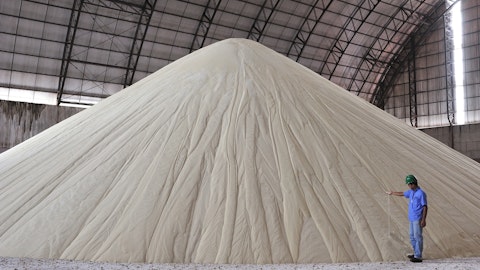Rich Sumner: Yes. So, for Trinidad, certainly want to be talking to the National Gas Company of Trinidad for both Titan and Atlas. The NGC is really in a number of different discussions right now. One is with the upstream and so they are in discussions with the major players in the upstream there. They are also have been working towards getting a standard ownership interest across all the LNG trains. And then obviously start the discussions with the downstream. So positive progress on all fronts. We understand, they’ve done one contract — upstream contract with BP. We also understand that they reached agreement on the unitization of the LNG and that set to be done in the first quarter and complete. I think that both those things are creating a better environment for now us getting into commercial discussions with — on the petrochemical side.
So we will be having those discussions this year. Some other positive news is recently is the Biden Administration just granted a license to Trinidad to develop a field, the Dragon field in Venezuela, which is a fourth Tcf field. That’s positive, because there is also — an even larger fields that borders — it’s more than double the size of the borders Trinidad and Venezuela. So it opens up the possibility for that to happen as well. So this progress happening there. We’ll have more to report throughout this year as progress takes place there.
Jacob Bout: Okay. Thank you.
Operator: Your next question comes from the line of Laurence Alexander with Jefferies. Please go ahead.
Laurence Alexander: Good morning. Could you give some detail on how you’re seeing the evolution of the Marine methanol demand and your line of sight to demand growth over the next couple of years? And what you’re seeing in China for both DME and industrial boiler demand?
Rich Sumner: Sure, I’ll start with the Marine Fuel. This is a really exciting area for us. We’re seeing a lot of interest right now. We — as of today, there is both ships that are on the water as well as orders that are on the books today. It’s over 100 vessels that, if run on methanol, 100% of the time would be 3 million tons of demand. But we also know that all major shipping companies are looking at methanol, either committed to methanol or looking at methanol in the container space. So that’s Costco, HMM, Maersk, CMA, CGM and others. So really exciting there, but we’re also seeing interest in all other sectors. Cruise lines, Disney just committed to their first cruise — large cruise vessel. Ferry has done a — first converted ferry vessel.
And then we know tug barge, dry bulk, et cetera. So we were really interested. We’re supporting that area, we expect to see it grow, continue to grow. We’re supporting in a number of different ways, trying to really help with shipping companies understand the technology of methanol, the logistics, the availability of methanol. We just did some demonstrations in the Port of Gothenburg with Stena during the first ship to ship bunkering in Sweden, as well as for our Ferry. So we’re supporting this in a lot of different ways and we’re also trying to understand their interest in low-carbon methanol and how that fits with potentially our investments in our sites as well as future projects. So really interesting space. I’m sure we’ll have a lot more to report on more vessels and more demand potential as that goes forward.





